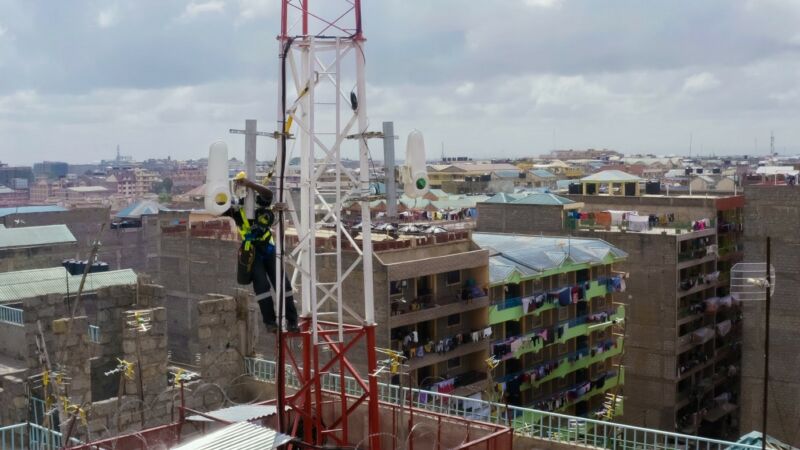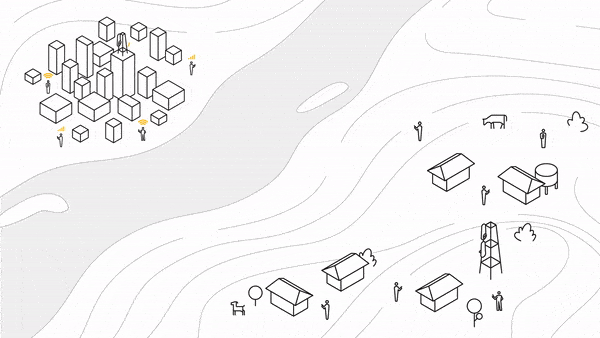IT'S A QUANTUM UNIVERSE
Wireless network in Kenya to use light beams, like fiber but without the cables.
JON BRODKIN - 11/10/2020, 12:29 PM

Enlarge / Piloting Taara’s wireless optical communication links in Kenya.
Alphabet will soon deliver wireless Internet over light beams in Kenya using a technology that can cover distances of up to 20km. Alphabet's Project Taara, unveiled under a different name in 2017, conducted a series of pilots in Kenya last year and is now partnering with a telecom company to deliver Internet access in remote parts of Africa.
Kenya will get the technology first, with other countries in sub-Saharan Africa to follow. Project Taara General Manager Mahesh Krishnaswamy described the project in an announcement from Alphabet today:
Project Taara is now working with Econet and its subsidiaries, Liquid Telecom and Econet Group, to expand and enhance affordable, high-speed Internet to communities across their networks in Sub-Saharan Africa. Taara's links will begin rolling out across Liquid Telecom's networks in Kenya first, and will help provide high-speed connectivity in places where it's challenging to lay fiber cables, or where deploying fiber might be too costly or dangerous—for example over rivers, across national parks, or in post-conflict zones.
Like fiber, without cables
Illustration of a Project Taara terminal delivering Internet access from a tall building to a remote area.
Alphabet
Similar to fiber-optic cables, Taara's technology uses light to transmit data, but without the cables. Krishnaswamy continued:
In the same way traditional fiber uses light to carry data through cables in the ground, Taara uses light to transmit information at very high speeds as a very narrow, invisible beam. This beam is sent between two small Taara terminals to create a link. A single Taara link can cover distances up to 20km and can transmit bandwidth of up to 20Gbps+—that's enough connectivity for thousands of people to be watching YouTube at the same time.
By creating a series of links from our partner's fiber-optic network over ground to underserved areas, Taara's links can relay high-speed, high-quality Internet to people without the time, cost, and hassle involved in digging trenches or stringing cables along poles.
The technology requires line-of-sight connections, so Alphabet deploys the terminals "high up on towers, poles, or rooftops." Krishnaswamy wrote that Taara links can "offer a cost-effective and quickly deployable way to bring high-speed Internet access to remote areas and help plug critical gaps to major access points, like cell towers and Wi-Fi hotspots." Alphabet encouraged other ISPs and mobile network operators to get in touch about deploying Taara in additional areas.Advertisement
Project Taara is one of the "moonshots" developed at Alphabet's X subsidiary (formerly known as Google X). Taara grew out of X's Project Loon, which had developed a balloon-based network to cover remote areas.
As Alphabet explains, "the Loon team needed to figure out a way to create a data link between balloons that were flying over 100km apart" and thus "investigated the use of FSOC (Free Space Optical Communications) technology to establish high-throughput links between balloons." After using those links to send data between balloons in the stratosphere, Loon engineers wondered if they could "apply some of that science to solve connectivity problems down a little closer to Earth," and Project Taara was born.
Wireless network in Kenya to use light beams, like fiber but without the cables.
JON BRODKIN - 11/10/2020, 12:29 PM

Enlarge / Piloting Taara’s wireless optical communication links in Kenya.
Alphabet will soon deliver wireless Internet over light beams in Kenya using a technology that can cover distances of up to 20km. Alphabet's Project Taara, unveiled under a different name in 2017, conducted a series of pilots in Kenya last year and is now partnering with a telecom company to deliver Internet access in remote parts of Africa.
Kenya will get the technology first, with other countries in sub-Saharan Africa to follow. Project Taara General Manager Mahesh Krishnaswamy described the project in an announcement from Alphabet today:
Project Taara is now working with Econet and its subsidiaries, Liquid Telecom and Econet Group, to expand and enhance affordable, high-speed Internet to communities across their networks in Sub-Saharan Africa. Taara's links will begin rolling out across Liquid Telecom's networks in Kenya first, and will help provide high-speed connectivity in places where it's challenging to lay fiber cables, or where deploying fiber might be too costly or dangerous—for example over rivers, across national parks, or in post-conflict zones.
Like fiber, without cables

Illustration of a Project Taara terminal delivering Internet access from a tall building to a remote area.
Alphabet
Similar to fiber-optic cables, Taara's technology uses light to transmit data, but without the cables. Krishnaswamy continued:
In the same way traditional fiber uses light to carry data through cables in the ground, Taara uses light to transmit information at very high speeds as a very narrow, invisible beam. This beam is sent between two small Taara terminals to create a link. A single Taara link can cover distances up to 20km and can transmit bandwidth of up to 20Gbps+—that's enough connectivity for thousands of people to be watching YouTube at the same time.
By creating a series of links from our partner's fiber-optic network over ground to underserved areas, Taara's links can relay high-speed, high-quality Internet to people without the time, cost, and hassle involved in digging trenches or stringing cables along poles.
The technology requires line-of-sight connections, so Alphabet deploys the terminals "high up on towers, poles, or rooftops." Krishnaswamy wrote that Taara links can "offer a cost-effective and quickly deployable way to bring high-speed Internet access to remote areas and help plug critical gaps to major access points, like cell towers and Wi-Fi hotspots." Alphabet encouraged other ISPs and mobile network operators to get in touch about deploying Taara in additional areas.Advertisement
Project Taara is one of the "moonshots" developed at Alphabet's X subsidiary (formerly known as Google X). Taara grew out of X's Project Loon, which had developed a balloon-based network to cover remote areas.
As Alphabet explains, "the Loon team needed to figure out a way to create a data link between balloons that were flying over 100km apart" and thus "investigated the use of FSOC (Free Space Optical Communications) technology to establish high-throughput links between balloons." After using those links to send data between balloons in the stratosphere, Loon engineers wondered if they could "apply some of that science to solve connectivity problems down a little closer to Earth," and Project Taara was born.
No comments:
Post a Comment